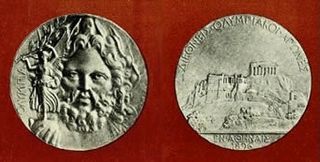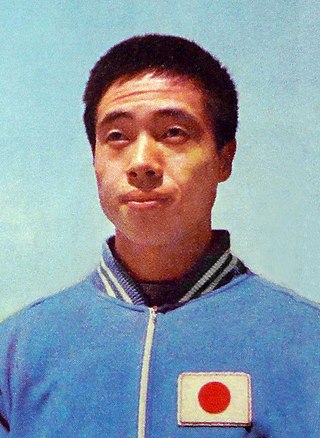
Judo is an unarmed modern Japanese martial art, combat sport, Olympic sport, and the most prominent form of jacket wrestling competed internationally. Judo was created in 1882 by Kanō Jigorō as an eclectic martial art, distinguishing itself from its predecessors due to an emphasis on "randori" instead of kata alongside its removal of striking and weapon training elements. Judo rose to prominence for its dominance over established jujutsu schools in tournaments hosted by the Tokyo Metropolitan Police Department, resulting in its adoption as the department's primary martial art. A judo practitioner is called a "judoka", and the judo uniform is called "judogi".

The Summer Olympic Games, also known as the Games of the Olympiad, is a major international multi-sport event normally held once every four years. The inaugural Games took place in 1896 in Athens, Greece, and the most recent was held in 2024 in Paris, France. This was the first international multi-sport event of its kind, organized by the International Olympic Committee (IOC) founded by Pierre de Coubertin. The tradition of awarding medals began in 1904; in each Olympic event, gold medals are awarded for first place, silver medals for second place, and bronze medals for third place. The Winter Olympic Games were created out of the success of the Summer Olympic Games, which are regarded as the largest and most prestigious multi-sport international event in the world.
The Olympic Oath is a solemn promise made by one athlete, judge or official, and one coach at the Opening Ceremony of each Olympic Games. Each oath taker is from the host nation and takes the oath on behalf of all athletes, officials, or coaches at the Games. The athletes' oath was first introduced for the 1920 Summer Olympic Games, with oaths for the officials and coaches added in 1972 and 2010. The oath is usually said in the language of the nation which is hosting the games; however, in 1994 both the athletes' and officials' oaths were said in English. Until the 1984 games the oath takers swore upon their nation's flag; since then all have taken the oath whilst holding the Olympic Flag. All three of the oaths were combined into one beginning at the 2018 Winter Games.

The 1964 Summer Olympics, officially the Games of the XVIII Olympiad and commonly known as Tokyo 1964, were an international multi-sport event held from 10 to 24 October 1964 in Tokyo, Japan. Tokyo had been awarded the organization of the 1940 Summer Olympics, but this honor was subsequently passed to Helsinki due to Japan's invasion of China, before ultimately being cancelled due to World War II. Tokyo was chosen as the host city during the 55th IOC Session in West Germany on 26 May 1959.

The 1940 Summer Olympics, officially known as the Games of the XII Olympiad, was a planned international multi-sport event scheduled to have been held from 21 September to 6 October 1940, in Tokyo City, Japan, and later rescheduled for 20 July to 4 August 1940, in Helsinki, Finland following the outbreak of the Second Sino-Japanese War in 1937. They were ultimately cancelled because of World War II alongside the 1940 Winter Olympics in Sapporo, Japan, and were the third games to be cancelled due to war.

An Olympic medal is awarded to successful competitors at one of the Olympic Games. There are three classes of medal to be won: gold, silver, and bronze, awarded to first, second, and third place, respectively. The granting of awards is laid out in detail in the Olympic protocols.

The International Olympic Committee (IOC) uses icons, flags, and symbols to elevate the Olympic Games. These symbols include those commonly used during Olympic competitions such as the flame, fanfare, and theme and those used throughout the years, such as the Olympic flag.

Sawao Katō is a Japanese former gymnast and one of the most successful Olympic athletes of all time. Between 1968 and 1976 he won twelve Olympic medals, including eight gold medals.

The 1964 Summer Olympics, officially known as the Games of the XVIII Olympiad, and commonly known as Tokyo 1964, were an international multi-sport event held in Tokyo, Japan, from 9 to 24 October. A total of 5,151 athletes representing 93 National Olympic Committees (NOCs) participated. The games featured 163 events across 19 sports and 24 disciplines. Two new sports were introduced to the Summer Olympic Games program in Tokyo: judo and volleyball. The inclusion of volleyball marked the first time that a women's team sport had been introduced.

Australia has sent athletes to every Summer Olympic Games, as well as every Winter Olympics except 1924–32 and 1948. In 1908 and 1912 Australia competed with New Zealand under the name Australasia.

An Olympic Village is a residential complex built or reassigned for the Olympic Games in or nearby the host city for the purpose of accommodating all of the delegations. Olympic Villages are usually located close to the Olympic Stadium within an Olympic Park.

National Olympic Committees that wish to host an Olympic Games select cities within their territories to put forth bids for the Olympic Games. The staging of the Paralympic Games is automatically included in the bid. Since the creation of the International Olympic Committee (IOC) in 1894, which successfully appropriated the name of the Ancient Greek Olympics to create a modern sporting event, interested cities have rivaled for selection as host of the Summer or Winter Olympic Games. 51 different cities have been chosen to host the modern Olympics: three in Eastern Europe, five in East Asia, one in South America, three in Oceania, nine in North America and all the others in Western Europe. No Central American, African, Central Asian, Middle Eastern, South Asian, or Southeast Asian city has ever been chosen to host an Olympics.

Modern pentathlon is a sport contested at the Summer Olympic Games.

The Japanese Olympic Committee is the National Olympic Committee in Japan for the Olympic Games movement, based in Tokyo, Japan. It is a non-profit organisation that selects teams and raises funds to send Japanese competitors to Olympic events organised by the International Olympic Committee (IOC).

The Empire of Japan competed at the Summer Olympic Games for the first time at the 1912 Summer Olympics in Stockholm, Sweden.

Kanō Jigorō was a Japanese judoka, educator, politician, and the founder of judo. Along with ju-jutsu, judo was one of the first Japanese martial arts to gain widespread international recognition, and the first to become an official Olympic sport. Pedagogical innovations attributed to Kanō include the use of black and white belts, and the introduction of dan ranking to show the relative ranking among members of a martial art style. Well-known mottoes attributed to Kanō include "maximum efficiency minimal effort" and "mutual welfare and benefit".

The closing ceremony of the 2020 Summer Olympics took place in the Olympic Stadium in Tokyo for about two and a half hours from 20:00 (JST) on 8 August 2021. The closing ceremony of the Olympic Games, which was postponed for one year due to the effects of the COVID-19 pandemic, was held without spectators. The scale was also reduced compared to past ceremonies as athletes were required to leave the Olympic Village 48 hours after their competitions finished.

Idaten: Tokyo Orinpikku-banashi is a Japanese historical drama television series and the 58th NHK taiga drama. It stars Nakamura Kankurō VI and Sadao Abe as marathon runner Shiso Kanakuri and swimming coach Masaji Tabata respectively. It began broadcasting in 2019 as part of the lead up to the 2020 Summer Olympics for which NHK was, under the Japan Consortium, principal co-host broadcaster. This drama marks the 55th anniversary of the 1964 Summer Olympics, which the NHK broadcast. It is the second post-war taiga drama in NHK history and the last series to premiere in the Heisei era and the first series to air during the Reiwa era. The series received an average rating of 8.2%, the lowest in history for a taiga drama.
A bronze statue of Kanō Jigorō is installed outside Japan Sport Olympic Square, in Shinjuku, Tokyo, Japan.
A bronze statue of Pierre de Coubertin is installed outside Japan Sport Olympic Square, in Shinjuku, Tokyo, Japan.















